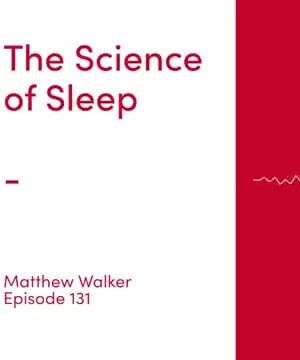According to Andrew Huberman, what is the duration of light viewing based on different weather?
Sources:
According to , the duration of light exposure should vary based on the weather conditions:
- On a clear day with minimal cloud cover, aim for approximately 5 minutes of sunlight exposure.
- On a day with moderate cloud cover, about 10 minutes of exposure is recommended.
- On heavily overcast or rainy days, try to get 20 to 30 minutes of sunlight exposure.
It's essential to ensure this light exposure is direct, without any barriers such as windshields or windows, as these significantly reduce the effectiveness of the light in triggering the necessary physiological mechanisms related to circadian rhythm functions 1.
RELATED QUESTIONSSummarize Sleep Toolkit: Tools for Optimizing Sleep & Sleep-Wake Timing | Huberman Lab Podcast #84
Summary of
In this episode of the , discusses a variety of methods and tools to optimize sleep and regulate sleep-wake timing. Here are the key takeaways:
- Morning Sunlight: Exposure to morning sunlight is crucial for setting your circadian rhythm, which helps in improving sleep quality.
- Sleep Supplements: The episode covers beneficial supplements for sleep, though specifics on the types or dosages were not detailed in the summary.
- Optimal Caffeine Intake: Timing and amount of caffeine consumption can significantly affect sleep quality, emphasizing moderation and careful timing.
- Food and Sleep: The relationship between diet and sleep is explored, suggesting how certain foods can influence alertness and sleep patterns.
- Sleep Environment: Adjusting your sleep environment, such as temperature and light exposure at night, can enhance sleep quality.
- Routine and Consistency: Establishing consistent sleep habits is emphasized as vital for long-term sleep health.
- Addressing Shift Work & Jet Lag: Specific strategies are discussed for managing sleep among those with irregular schedules or those experiencing jet lag.
This episode provides holistic insight into improving sleep through environmental controls, dietary habits, and routine management.
RELATED QUESTIONSTell me more about optimal caffeine intake for sleep.
Sources:
Optimal caffeine intake for sleep primarily involves managing the timing of consumption to prevent adverse effects on sleep quality. Here are some expert insights:
-
Limiting Caffeine Before Bed: emphasizes the importance of avoiding caffeine intake in the 12 hours prior to sleep to ensure it does not disrupt slow-wave sleep, which is crucial for physical and mental restoration. Occasionally, this can be adapted to 8-10 hours if 12 hours is not feasible, but earlier is generally better for sleep quality 1.
-
Morning Caffeine Strategy: To optimize sleep and wakefulness, delaying caffeine intake for 90-120 minutes after waking up can be beneficial. This allows the body to clear out any residual sleepiness-causing adenosine naturally 2.
-
Caffeine Disruption of Deep Sleep: Even if you fall asleep without difficulty, notes that caffeine consumed even many hours before bed can still reduce the quality and quantity of deep sleep, impeding the body's recovery processes. This could lead to feelings of insufficiency in sleep and unrefreshment upon waking 3.
-
Personal Caffeine Limits: Recognizing personal sensitivity to caffeine and its timing can help maintain sleep quality. Ideally, caffeine should be consumed no less than 4-8 hours before bedtime, and adjusting based on personal response can be effective 4.
Overall, managing caffeine intake by monitoring the amount and timing—particularly avoiding it in the afternoon and evening—can significantly enhance sleep quality and overall health.
RELATED QUESTIONS-




